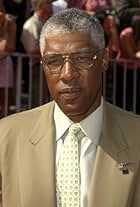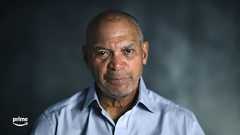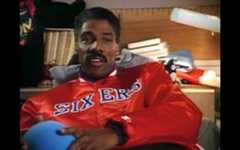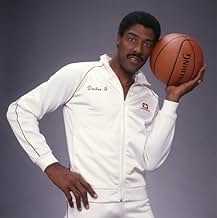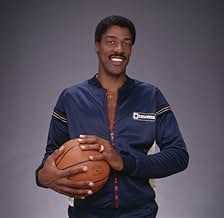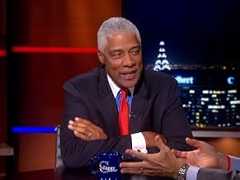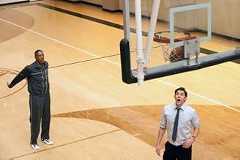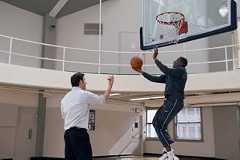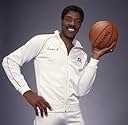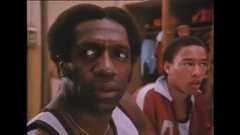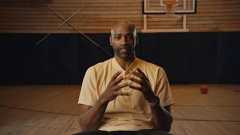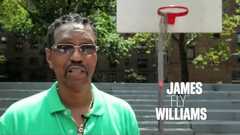One of the NBA's first superstars Julius Erving's high flying hardpowered style brought the NBA and basketball to levels previouslyunheard of. Julius Erving was born in Hempstead New York in 1950. Hegrew up in a housing project, the son of a single mother, with twosiblings. His father having left when he was three his motherremarried, and they moved to nearby Roosevelt, New York. His motherwanted his children to have a better life, and she realized thatbasketball might be a way out for his young son. Before going to highschool Erving averaged 11 points a game with his Salvation Army team.At Roosevelt High school he began to flourish, competing in statewidetournaments, getting named on many occasions to various all Long Islandteams, and receiving other different awards. Erving averages 26 pointsand 20 rebounds, one of the few players in NCAA History to average 20of both statistics. In a time when few players left college early tojoin the Pros Julius Erving did just that. He signed with the ABA'sVirginia Squires, a league which was not opposed to players enteringprofessional basketball early. He signed with the Atlanta Hawks in1973, but legal entanglements prevented him from playing with the team,as well as the Milwaukee Bucks, which also drafted him. By this timethe ABA was talking about a merger with the NBA, but Oscar Robertson'splayer union was preventing this from taking place. The ABA was takinga lot of top flight players from college who would have had excellentcareers in the NBA, as well as taking current NBA players and placingthem on ABA rosters. For a time it seemed as though the NBA wouldsubmerge in favor of the ABA. However extremely lackluster ABA markets,unstable ownership, too many team moves, and lackluster ABA marketsproved too much for the league. After starting with the Squires, Ervingwas traded to the Nets. He became an incredible scorer, an incredibletalent, and considered to possibly be the most explosive basketballplayers period, he won a few championships, scoring titles, and was oneof the all around best players in basketball. By 1976 the ABA was nolonger a significant force, teams collapsed, owners and players wereboth disgruntled, and the ABA didn't have any significant talent tomarket, except for Dr. J. What is not clear is how he got his nickname,but it is thought that as a doctor he would cure anyone who thoughtthey could take him on. It was a nickname he had since college. In acontractual dispute with his team he was bought by the Philadelphia,for a then record then 3 million. Erving had been a basketball icon foryears, with his Afro, his intense style, and his in your face on thecourt manor. It played very well with his fans, and would become astaple in Philadelphia, joining a high flying spectacular team ofDarryl Dawkins, Lloyd B. Free, and others. The team went to a 50-32record, the undoubted leader of his team. However the spectacular teamyet again fell to fundamentals. Erving advanced his team to the finals,winning the first two. Erving and his teammates has said the series wasover before they started. However their opponents the PortlandTrailblazers, led by Bill Walton. Walton led his team to four straightfinals victories to win the teams first ever finals. For the next twoyears the Sixers became a fun team to watch, and they would go deepinto the playoffs routinely, but they never could win. By 1979 the NBAwas in crisis, ratings, and attendance were down. The NBA was perceivedto be too black, too into drugs, and disco, and was viewed as too muchfor one part of society, no doubt a result of bigotry, as a largepercentage of players in the NBA were black. But that year would be awatershed year for the NBA. Larry Bird and Magic Johnson entered, andErving changed his image. He cut of his afro, made his image a littlemore clean, took the in your face element out of his game, but remainednone-the-less spectacular. While he was a player with a lot of flair alot of observers said his game was not nearly as flaring as it was inthe ABA. But in 1980 Erving would rekindle an old rivalry, and start anew one. The old one came against arch-rival Boston, led by Larry Bird.That was a crucial match-up as both players were the undoubted leadersof their teams, and both were small forwards. But the Sixers wererevamped as well, a little less spectacle, and a little morefundamental. This was obvious in new point guard Maurice Cheeks anddefensive minded six man Bobby Jones. While the team beat Boston, theywere no match for the Mgic Johnson, Kareem Abdul-Jabbar, Jamaal Wilkes,and the L.A. Lakers in the finals losing in six. Next year Philadelphiahad the best record in the NBA, split with Boston. L.A. suffered thatyear and was eliminated in the first round, so everyone knew thatPhiladelphia and Boston would meet in the Conference finals, and morethan likely would win the finals. The matchup was one of the classics.Philadelphia was now a much more fundamental team, while the Celticswere now revamped with new big men Kevin McHale and Robert Parish. Inthe Boston Garden the series was split in the first two games. The nexttwo in Philadelphia's Spectrum Philly won. Boston won the next one inthe Garden, then the next one in the Spectrum, the margins in most ofthese games were as low as 1 and as high as 3, Philadelphia in many ofthe game blowing leads. In Game 7 in Boston Garden it happened again.Philadelphia was up by as many as eleven, but in a very physical fourthquarter a Larry Bird field goal, the only field goal in the last twominutes stopped the Sixers yet again. The next year a hotly contestedseries with Boston went the Sixers way in seven but yet again they lostto the Lakers n the finals. In 1982 the Sixers realized they had aminor problem: they had great offense, and fair defense, a defense thatreally could not compete with the elite teams. The Sixers signed MosesMalone, getting rid of power forward Caldwell Jones to Houston. Thisteam, led by Erving and Malone with a supporting cast of Andrew Toney,Maurice Cheeks, Bobby Jones, Mark Iavaroni, and an excellent bench, theteam exploded and was considered one of the ten best ever. Moses Malonewas MVP, Erving All Star MVP, both All NBA First Team, Bobby Jones wasSixth Man of the Year, leading the team to a 65-17 record. It was anNBA crowning achievement, proving to be the pride of Philadelphia,giving it's basketball team an elusive championship. But success provedfleeting for the Sixers. Next year the injured and aging Sixers lost infive in the first round to the upstart New Jersey Nets. While it was asad way to go out it was obvious the Sixers especially Erving was olderand not what he used to be. Despite that the team the next year wouldplay the now stellar Boston Celtics in the conference finals, and losein five. Afterward the Sixers never got to the conference finals againwith Erving, despite acquiring emerging superstar, and legend CharlesBarkley. He retired in 1987, a true legend in basketball, and inPhiladelphia. He was considered an unofficial ambassador to the game,and also an avid philanthropist, helping the game reach heights ofpopularity never before seen. Since then Erving is on the board ofdirectors of Coca Cola, a broadcaster for a short time, and always alegend who advertises and promotes the game.
BornFebruary 22, 1950
Actor
Director
Producer
- Alternative names
- Julius 'Dr J' Erving
- Height
- 1.98 m
- Born
- SpousesDorys Madden2008 - present (3 children)
- ChildrenAlexandra Stevenson
- RelativesSibling(Sibling)
- Other worksTV commercial for Converse shoes (c. 1970s)
- Publicity listings
- TriviaIs the father of professional tennis player Alexandra Stevenson.
- QuotesWith black kids, it's always a struggle for pride. Basketball was my way out. I worked hard to make sure it was.
- TrademarksSlam dunking from the free-throw line
- Nickname
- Dr. J
FAQ
Powered by Alexa
- How old is Julius Erving?75 years old
- When was Julius Erving born?February 22, 1950
- Where was Julius Erving born?Roosevelt, Long Island, New York, USA
- What is Julius Erving's birth name?Julius Winfield Erving II
- How tall is Julius Erving?6 feet 6 inches, or 1.98 meters
Contribute to this page
Suggest an edit or add missing content

